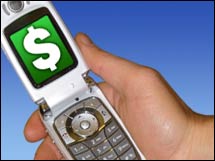|
Mobile browsing gets a '.mobi' fix Web services for mobile phones are in urgent need of a jumpstart. A new domain is at least a step in the right direction.
(Business 2.0 Magazine) -- Tried surfing the Web lately from a mobile phone? Then you know what a pain it is. Websites can take an excruciatingly long time to load and the pages eventually appear are often so jumbled they're unreadable. But this hasn't stopped companies across all industries - from AOL to Verizon Wireless to Nokia - from furiously developing Web-based content, services and phones aimed specifically for mobile masses.
The reason: they're all angling for a big chunk of the wireless services market, which will hit an estimated $698 billion in yearly sales by 2009 as mobile phones replace the PC as the primary communication device, according to Yankee Group. Data services will account for 21 percent, or $147 billion. But to get there, the technical problems that now make mobile Web browsing so cumbersome for consumers need to be fixed. And that's where ".mobi," a new top-level domain for websites viewed on handheld devices, comes into play. Shrunk to fit Backed by a consortium of powerful companies like Google, Microsoft, Samsung Electronics and Vodafone, .mobi became available for general registration last week. Since then, as estimated 75,000 .mobi domain names have been registered, according to domain name reseller Go Daddy. The .mobi domain is garnering so much interest because companies that use it must adhere to some basic rules aimed at making mobile browsing easier. For instance, they must drastically simplify the design of their Web pages, use far fewer graphics, and ban pop-up ads altogether. "This is not a 17-inch screen squeezed into two inches," says Neil Edwards, CEO of dotMobi, a non-profit company founded by the .mobi consortium to handle the global registration of the new domain. A. mobi site "fits the screen, the navigation works, and it's fast - as fast as one tenth the data rate of a regular site," continued Edwards. There's no question that the mobile Web could use a kickstart. A scant 10 percent of cell phone users report having browsed the mobile Web, according to JupiterResearch. And while CTIA, the leading wireless association, reports that data services revenue came to $6.5 billion in the first six months of this year, that figure is less than 11 percent of wireless service revenues. The mobile Web, in other words, has a long ways to go. A good start, but... So is .mobi the answer? There are plenty of skeptics. To some analysts, .mobi is little more than a marketing ploy aimed at generating buzz around the inchoate mobile Web. Rather than help problem, they say, .mobi will only confuse users who will now have to remember to insert separate Web addresses for the same site, depending on whether they're using a computer or a handheld. What's more, some think there are better solutions. One way to make mobile browsing less wieldy: build networks that can detect which device is being used to browse the ".com" Web sites, and then instantly reformat and deliver content to fit the device's parameters. Julie Ask, a JupiterResearch senior analyst, thinks it's too soon to know if .mobi will takeoff or flameout. One thing it won't be, she says: the hoped-for panacea for mobile browsing's ills. "Certainly Web browsing on cell phones has to get better in order for people to use it more," says Ask. "But .mobi can't fix all of the problems [that mobile Web browsing faces]." She notes that vast majority of consumers still don't own phones with QWERTY keyboards. Plus, let's face it, who wants to triple click their way around the Web, even if .mobi makes mobile sites quicker to download? Moving forward The uncertainty isn't stopping corporate America from putting .mobi to the test. BMW, Microsoft's (Charts) MSN and CNNMoney are all launching .mobi sites. (CNNMoney, AOL and Business 2.0 are owned by Time Warner (Charts)). And DotMobi's Edwards estimates that several hundred thousand .mobi domain names will be registered by 2008. The volume of .mobi registrations doesn't mean there's a mobile Web revolution in the making. It's entirely plausible that companies are snatching up names to safeguard against trademark infringement or fraud, says Ask. Even so, for $30, registering a .mobi name could be worth the gamble. If the cutesy suffix ever takes off - and when Web browsing-friendly handsets become ubiquitous - at least companies will be prepared. |
Sponsors
|

